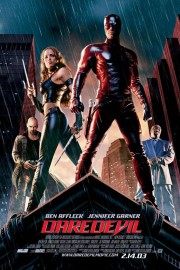Daredevil
Now that the Man Without Fear from Hell’s Kitchen has become part of the official Marvel Universe, I felt it was time to rewatch the 2003 movie that first introduced him to a wider audience. Full disclosure: the better part of five episodes I’ve seen of Marvel’s new Netflix series about Daredevil runs circles around this film. I’ve never seen the much-better received DVD cut of Mark Steven Johnson’s film, although I’ve heard it’s a much sharper film. Still, when I first saw the film in theatres, I didn’t think it was bad. Would that feeling hold up, like it has for Bryan Singer’s “X-Men,” or would I find I overpraised it, like Sam Raimi’s “Spider-Man?”
Let’s start looking for the answer to that question with Ben Affleck, who plays Matt Murdock, the blind lawyer from Hell’s Kitchen who moonlights as a vigilante at night, helping those who need it get justice when the law fails them. In retrospect, Affleck was not a great choice for the role; yes, he was a star at the time, thanks to hits like “Armageddon” and “Pearl Harbor,” and was an Oscar-winner for writing with his BFF Matt Damon for “Good Will Hunting,” but he didn’t quite have the chops at the time for a role like Murdock. (Michael C. Hall, who was a few years away from being a TV star for “Dexter,” would have been a better choice.) But then again, he wasn’t being asked to play a uniquely brutal, morally absolute vigilante, but a populist version of the character modeled after Spider-Man, who just had a hit film the previous year. The approach to the character was wrong, and while one can certainly pin some of that on Affleck (who’s never been that deft a performer, and certainly wasn’t at that time), it’s the writing and directing by Johnson (who had only one film, the maligned “Simon Birch,” to his name before this one) that really fails him. This is the epitome of lazy superhero filmmaking and writing. Two years later, Chris Nolan brought the type of ambiguity Daredevil requires to Batman in “Batman Begins.” Imagine what might have been possible if he was three years earlier. You can crap on how, after Nolan’s “Dark Knight” trilogy, studios wanted to bring darkness into everything superhero movie, but maybe we wouldn’t have had to wait so long for “Daredevil” to return to pop culture relevance away from the printed page. What’s done is done, though, and while Affleck was at his creative low point around the time “Daredevil” came out, you can’t blame him for the film’s failures– in actuality, he does what he can.
The supporting characters around Murdock have better luck, starting with Elektra Natchios, the daughter of a wealthy businessman, played by Jennifer Garner. Elektra fell on hard times movie-wise two years later with a spin-off film, but Garner (the future Mrs. Affleck) does a great job with what’s she’s given here, utilizing the tough-girl persona she had developed on the hit show, “Alias,” into a solid foundation for a different character. She has similar issues to deal with than “Alias’s” Sydney Bristow, but there’s a different energy to the character, and Garner does a fine job doing something else than just “Alias” on the big-screen. Commonly successful in his role is Colin Farrell, who steals the movie as the Irish assassin Bullseye, who comes to New York at the beset of the Kingpin (Wilson Fisk, played by the late, missed Michael Clarke Duncan). Farrell was a hot name at the time, as well, and arguably, he lost out the most when Fox didn’t continue on with “Daredevil” after the indifference this movie was met with by fans, because he was sensational in the wicked role.
Garner and Farrell, along with the chemistry between Garner and Affleck, make up for a lot of the flaws, as do performances by Joe Pantoliano as a reporter who has an interest in Daredevil and Jon Favreau (who would begin the MCU properly five years later as the director of “Iron Man”) as Foggy Nelson, Murdock’s partner in law. (The soundtrack, which includes songs from Fuel and Evanescence to go along with a dark score from “The Crow” composer Graeme Revell, helps, as well.) Ultimately, though, it’s not enough to keep “Daredevil” from merely being mediocre. It follows too many of the rules that were being written for superhero movies rather than just forging it’s own path like the best ones have done. The humor is humorless, the drama is tepid and unmoving, and the style is borrowed from other, better movies. (How Johnson later directed the first “Ghost Rider” is kind of baffling, actually.) I do want to see the Director’s Cut sometime, just to see if it does, indeed, improve on this film. I doubt it’ll top what Marvel is doing with Daredevil now that the character is back in it’s hands, but given where the character started, I doubt it’ll be a disappointment like the theatrical version was.










